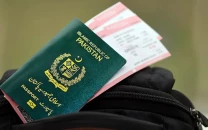Time to look beyond our crisis?
Pakistan’s problems are almost always blamed on invisible external hands, opposed to real internal decline and decay.

Historian Ayesha Jalal in her essay “The Past as Present” skewers the Pakistani state of mind in formulations that only she could produce. She calls Pakistan “paranoidistan”. Focusing on the ‘US or us’ binary thinking, she tells us how an ISI chief tackled an audience in Peshawar. After the discussion ended in pandemonium, General (retd) Asad Durrani blurted out: “Leave all this discussion, let me ask the audience whether they want Taliban to win or the US? Just raise your hand” (p.8). The answer was, overwhelmingly, Taliban.
Jalal says: “Terrorist attacks in key cities when claimed by the Pakistani Taliban, are ritually blamed on American private security agencies such as Blackwater and DynCorp as strategic revenge for Pakistan’s refusal to break off ties with the Afghan Taliban and deliver the ever-elusive Osama bin Laden. Besieged by enemies within and without, television’s spin-doctors, impelled by the state’s intelligence agencies, attribute Pakistan’s multifaceted problems to the machinations of invisible external hands, as opposed to historically verifiable causes of internal decline and decay.”
She points to an agency-media nexus in this observation: “If India’s hegemonic designs are not hindering Pakistan at every step, America and Israel are believed to be hatching plots to break up the world’s only Muslim nuclear state. Call it paranoia, denial or intellectual paralysis, but Pakistan’s deeply divided and traumatised people are groping for a magical formula to evade collective responsibility for their failure to gel as a nation.”
More insights are worth quoting: “A psychologically introverted national mindset, resistant to critical self-reflection tends to be suspicious and paranoid. This is not to say that there are no grounds for harbouring suspicions of friends and allies, not to mention enemies, but Pakistanis need to ponder why they have ended up as the world’s favourite whipping boy” (p.9).
And finally: “Forced to imbibe official truths, the vast majority of literate Pakistanis take comfort in ignorance, scepticism and most disconcertingly, in a contagion of belief in conspiracy theories. The self-glorification of an imagined past matched by habits of national denial have assumed crisis proportions today when Pakistan’s existence is under far more serious threat from fellow Muslims than it was in 1947 from rival non-Muslim communities”. (p.10).
Shuja Nawaz tackles the more delicate subject of army and politics: “With a civilian government in charge again, the role of the ISI will need to be tempered. The army high command will want to favour greater oversight of the ISI by the civil authority and even parliament, with the involvement of the military. If Kayani’s studied silence in the episode involving the browbeating in the Army House in March 2007 and subsequent arbitrary removal of the former chief justice by Musharraf is any indication, he could end up favouring a reduced political role of the ISI, allowing it to concentrate on important counter-intelligence operations”.
Shuja Nawaz is probably the most balanced writer whose critique the army should listen to. He is also the most credible writer on the army for the outside world. He would be glad to know that Kayani has gone after the Islamist elements infecting his force without caring too much about the media noise arising out of the PNS Mehran attack in Karachi.
Published in The Express Tribune, July 3rd, 2011.



1729685382-0/Untitled-design-(57)1729685382-0-208x130.webp)










COMMENTS
Comments are moderated and generally will be posted if they are on-topic and not abusive.
For more information, please see our Comments FAQ